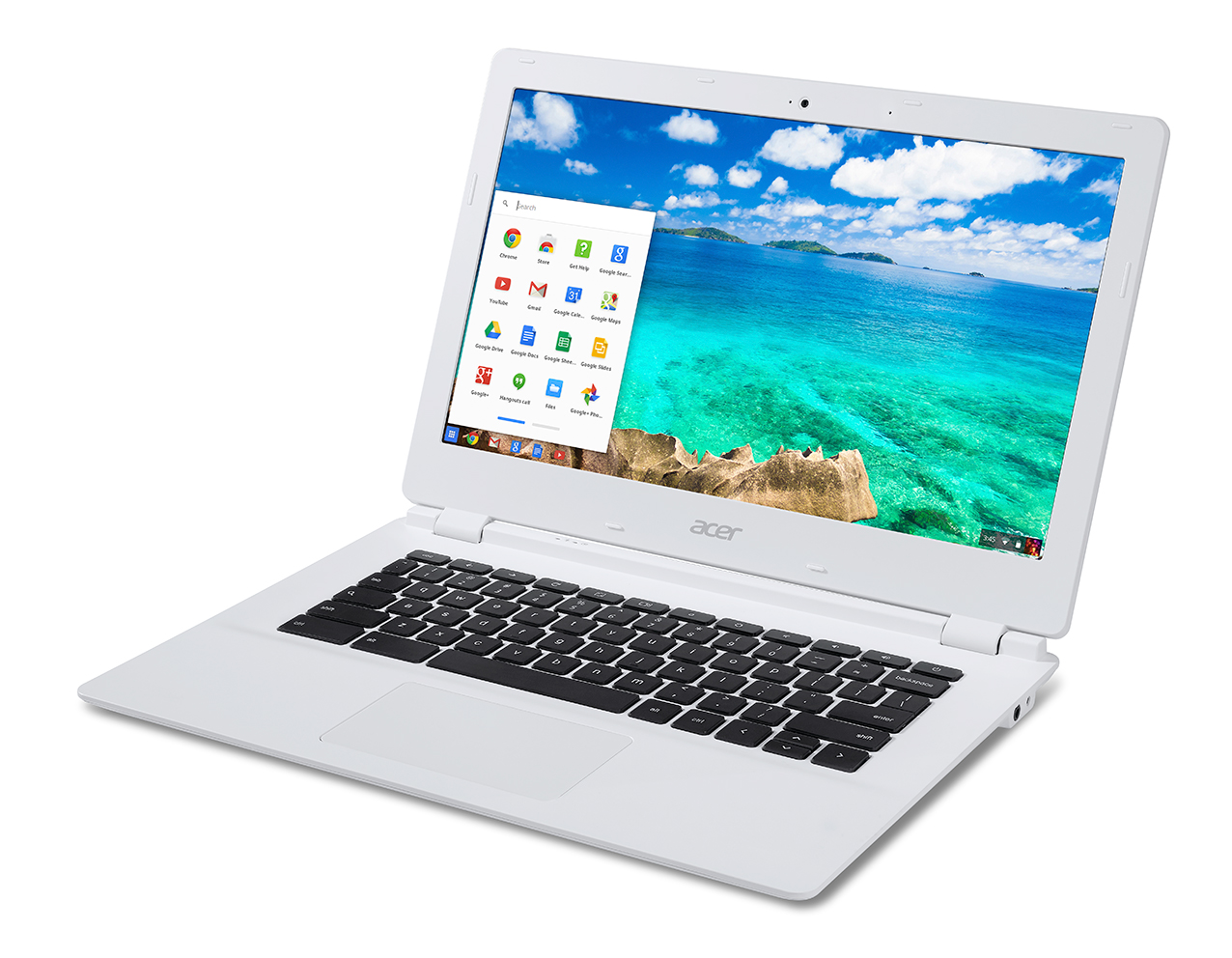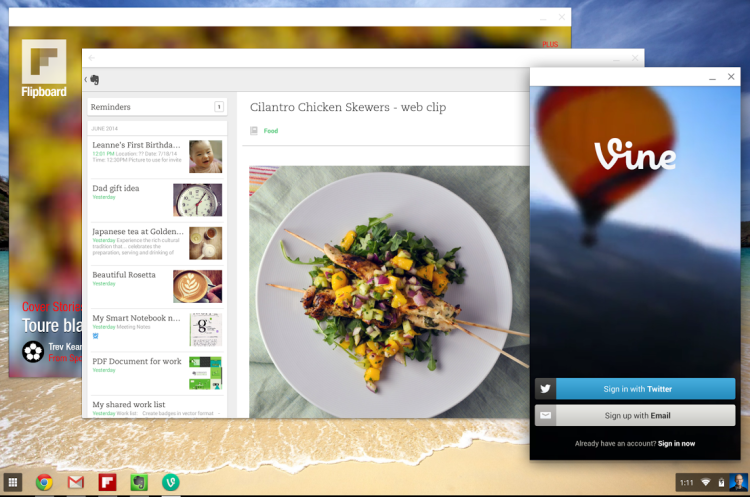Surge In Chromebook Sales Catches LCD Suppliers Off Guard
According to a report from NPD Displaywatch, demand for LCD panels this year is outstripping the supply, mainly because of a surge in Chromebook sales and a rush to replace old Windows XP machines.
LCD manufacturers have been caught off guard by the sudden increase in demand, and the current supply of LCD panels doesn't seem enough to satisfy the market demand. The LCD makers have responded to this issue by raising the prices on their existing supply of panels as more OEMs fight to get them.
Chromebooks are becoming increasingly more popular lately for both consumers and organizations, especially as more powerful processors with higher quality- and resolution panels appear in them while still keeping low price points.
The biggest appeal of Chromebooks, despite Microsoft's attempts to paint them as "not real computers," is their simplicity and high security, which is in many ways the opposite of Windows PCs.
A Chromebook is easy to use because there's really not much else in there except the Chrome browser. So if you know how to use a browser, you know how to use a Chromebook. No tutorials or deep learning curves are necessary.
That means Windows PC viruses aren't a concern, either. In addition, Chrome is consistently the highest rated browser when it comes to security, thanks for the most part to its process sandbox that keeps tabs and extensions tightly contained.
The low prices of Chromebooks coupled with good performance on that cheap hardware have also played a major role in the popularity of Chromebooks. In fact, right now, few would like a $1,000 machine that's "just a browser."
Get Tom's Hardware's best news and in-depth reviews, straight to your inbox.
In the future, Google plans to expand the functionality of Chromebooks by adding support for Android apps, but that could take a while as Google figures out how to do it without hurting the performance of Chromebooks or their strong security model (which gets a lot more complex once Android apps are introduced into the Chrome OS ecosystem). That could further increase the demand for Chromebooks, as the people who wanted more than a browser OS start finding them useful, too.
Follow us @tomshardware, on Facebook and on Google+.
Lucian Armasu is a Contributing Writer for Tom's Hardware US. He covers software news and the issues surrounding privacy and security.
-
dextermat So many computers I repair has chrome with full of toolbars and malware addons.....Reply
Windows or other OS; the best anti-virus is the user that CARES about what they are doing... -
soccerplayer88 Chromebooks never really caught my attention. I very much doubt this surge of sales is coming from business customers and more likely being adopted by the consumer base.Reply
I'll be waiting for the surge of small notebooks (not sure you can even call them 'netbooks' with a 14" screen) coming this fall/winter. It's actually going to be a good time for us seeing as most of our technicians at our business are in need of an upgrade. -
photonboy Poor article.Reply
The first part about screen availability is fine, but then the article glosses over the difference and even seems to suggest that Chromebooks are inexpensive where laptops are ($1000 ?).
There are plenty of Chromebooks now with similar specs and price to budget laptops (i.e. $200 to $400). -
Steve Simons I have been impressed with Chromebooks and many of my students bought one for college this year. Good battery life, no viruses, and in college, they are always connected to the wifi. Plus, if it breaks, is stolen, etc, it's only $200 to replace it. It's college season and as more and more school districts go 1:1 (student to technology ratio), students are often buying less technology during high school creating a bubble when they enter college (no longer having that technology as many districts require students to return the tech upon graduation).Reply
I would love them even more if they could run itunes. So would most of my students. -
jasonelmore I just wish chromebook's could Dual Boot. The hardware is there to do it, however the OEM's are disabling that ability.Reply
I've repaid a few chromebook's as well, and recovery does not always go as planned. In a few instances, i've had to ship the chrombook's back for re-imaging because the recovery usb key's kept failing at verifying data and would not write. -
Solandri Reply
I'm seeing a lot of schools adopt Chromebooks. They're half the price of an iPad but have a keyboard, thus making them much more useful. Lessons on a Chromebook are basically a web page with Chrome add-ons, so students/parents are free to use their regular laptop or desktop (with the Chrome browser) to access those same lessons if they don't want to use a Chromebook. With iPad lessons, the school or parents were forced to buy an iPad.14016363 said:Chromebooks never really caught my attention. I very much doubt this surge of sales is coming from business customers and more likely being adopted by the consumer base.
I wouldn't count out businesses either. I do computer consulting on the side. I'm seeing an increasing number of small businesses using Google Docs despite all the cautions about cloud computing. These are businesses which are too small to afford even a single full-time IT staff (which is why they hire me). Having their office productivity apps and files maintained and backed up by Google, and accessible with new hardware just by installing a browser is very attractive to them. The downtime when they lose Internet access is nothing compared to the downtime when they encounter software problems on their local computer. It's basically a revival of the thin client, except this one seems to actually be catching on among certain size small businesses. -
ZolaIII A cheap laptop with hard disc & Linux or no OS is by far more usable than any Chrome book. If simplicity is striped down Linux with tied up choice (without any freedom) I really piety that much simply minded people that really believe so. An old story Linux and viruses, nothing to be thankful to Google about that. Even striped down Chromium is a big step forward from Chrome, yes you will need to install extensions that you really need in that case. I have to mention Gecko & Gecko based browsers that are by my opinion much better choice on machines with less ram. I have to honor my respect to Mozilla developer for they efforts in integrating & future developing really useful futures like: jmalloc, reworked turbo jpeg lib and so on.Reply -
OcelotRex ReplyA cheap laptop with hard disc & Linux or no OS is by far more usable than any Chrome book. If simplicity is striped down Linux with tied up choice (without any freedom) I really piety that much simply minded people that really believe so. An old story Linux and viruses, nothing to be thankful to Google about that. Even striped down Chromium is a big step forward from Chrome, yes you will need to install extensions that you really need in that case. I have to mention Gecko & Gecko based browsers that are by my opinion much better choice on machines with less ram. I have to honor my respect to Mozilla developer for they efforts in integrating & future developing really useful futures like: jmalloc, reworked turbo jpeg lib and so on.
Yes, those are all good points. I will get you a counter-point: chromebooks can run netflix in the browser and don't need work arounds.
-
Urzu1000 Chromebooks are excellent for people who know very little about computers in general, and prefer to just browse Youtube and Netflix.Reply
Not me, but, you know. "Those" people. Normal people. Outside.

